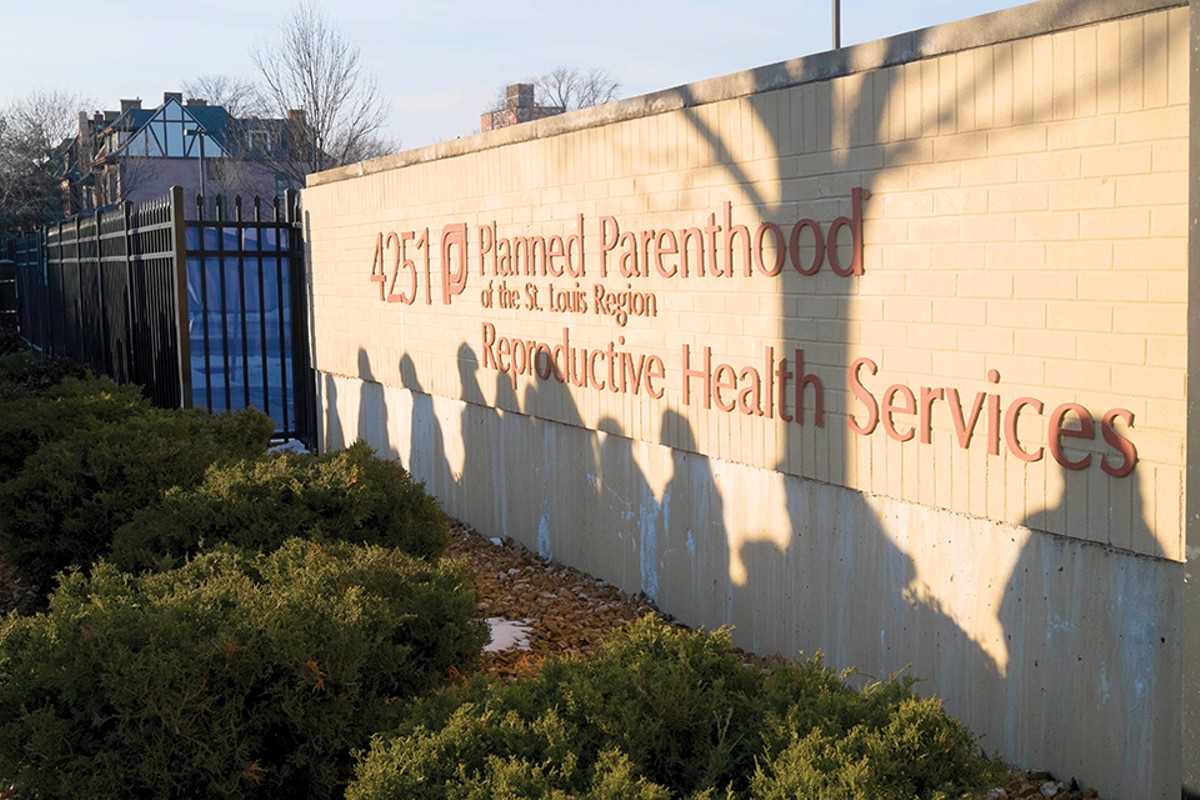On a chilly Wednesday night this winter, students huddle around a bay of computers at a library in St. Louis County — some of them studying, some possibly playing Fortnite. Brightly lit with pristine white walls and furniture featuring sleek finishes, the space feels shiny and new.
Just behind the fleet of computers is a glass-lined meeting room, its design reminiscent of an observation room. Or a fishbowl. The space sometimes hosts anime movie nights or slide-dancing classes, but tonight, it's where a group of people have gathered to discuss their personal experiences learning about sex ed, reproductive health care and more.
These groups, often ranging from teens to people in their 70s or 80s, are hosted by NARAL Pro-Choice Missouri, the state affiliate of the national nonprofit that aims to protect and expand abortion access. The events are part of NARAL's Reproductive Freedom Listening Tour, which began last August and ends in June.
The tour has taken NARAL's team of six employees across Missouri to hear what reproductive health issues are impacting the lives of people in the state. So far, the small staff has visited Rolla, Kansas City, Joplin, Cape Girardeau, Potosi, Jefferson City and Columbia, as well as spots across the St. Louis area. The conversations have included questions about abortion access — including people wondering if the procedure is still legal in Missouri — while also covering issues across the spectrum of reproductive health care.
"The Listening Tour is empowering people that their voices will be heard and mean something, and encouraging them to tell their stories, not just on abortion but on the full range of reproductive freedom health issues," says Mallory Schwarz, executive director of NARAL Pro-Choice Missouri. "Your voice is powerful; your voice moves policymakers."
The Listening Tour is also an opportunity for NARAL to connect with people across the state after a particularly tumultuous 2019 that saw major gains for anti-abortion politicians and activists.
For decades, conservative legislators have hollowed out the abortion provider network in Missouri, resulting in only one clinic still offering those services in the state today. Access to care is as bad as it's been in generations, and the state is presently in danger of becoming the first in the U.S. with no abortion provider.
While abortion bans are being proposed and signed into law across the country, in Missouri, little by little, anti-abortion legislation has chipped away at access through regulations — ones that critics say are medically unnecessary. This has left groups such as NARAL with their backs against the wall, but the fight isn't over. In fact, abortion could be a crucial issue in the upcoming Missouri gubernatorial race, perhaps for the first time ever.
Sitting around a table at the library, it may seem a little odd to share such personal stories with strangers — stories about your earliest memories of sex ed at home or in school, your experiences giving birth and raising children, or why you chose to have an abortion. These conversations feel even stranger as we're sitting in that fishbowl — but the group quickly opens up and finds connections in shared life experiences.
As the discussion gets underway, an elderly woman describes her earliest memories of sex ed — or more specifically, the lack of it. Growing up in the '40s and '50s, she says her parents never uttered the word "sex" at home. School didn't prove any more informative on the subject.
By 21 she had two children born within two years of one another. To support herself, she took a job at a fast-food restaurant and, later, at a factory. With the help of a physician, she also gained access to birth control for the first time in her life. Although her pregnancies were not planned, she says she would never have chosen to have an abortion because of her Christian faith. Her path as a single parent wasn't easy, she says, but she has no regrets.
Sitting next to the woman is a teenager, the youngest person in the room, who recently graduated from high school. When asked if she's comfortable sharing her earliest memories of sex education, she describes positive experiences both at home and in school, where she says she learned about reproductive health care and sex ed during all four years of high school. Birth control, she says, was the main thing the school communicated to students, as well as how to avoid sexually transmitted infections.
This comprehensive approach to sex ed surprises the room — it is the first story shared so far that reflects medically factual information and promoted various methods of birth control and contraception. (Several of the other sex ed stories previously shared in the group involved fourth or fifth graders being separated by gender and watching films about "our changing bodies.")
The teen's experience is encouraging to everyone in the group — perhaps sex ed has come a long way since the days of stilted videos and clumsy euphemisms. After all, study after study, including one from 2019 published by the Brookings Institution, has shown that when people are educated about contraceptives and have easy access to them, unintended pregnancy rates decline.
Schwarz says that some of the most frequent subjects discussed at the events have been sex education and birth control. In Missouri, state statute is somewhat vague with regard to sex ed, stating only that programs should teach children about contraception and preventing STIs, but that every curriculum must teach that abstinence is the preferred way to prevent both.
The vagueness at the top means that at the local level, every school is distinct and curriculums can vary widely. "Really the biggest thing that's come out [of the Listening Tour] that we've heard is sex education," Schwarz says "[Students] are not learning about how to prevent STIs, and we're seeing the STI rates across the state skyrocket, with outbreaks across rural Missouri. So this isn't an issue where you can say, 'Oh, well it's just in the cities.' We're just not setting our kids up to go out in the world and be healthy adults."
Unfortunately, comprehensive sex ed is only one way that Missouri isn't supporting reproductive health care for people across the state.






